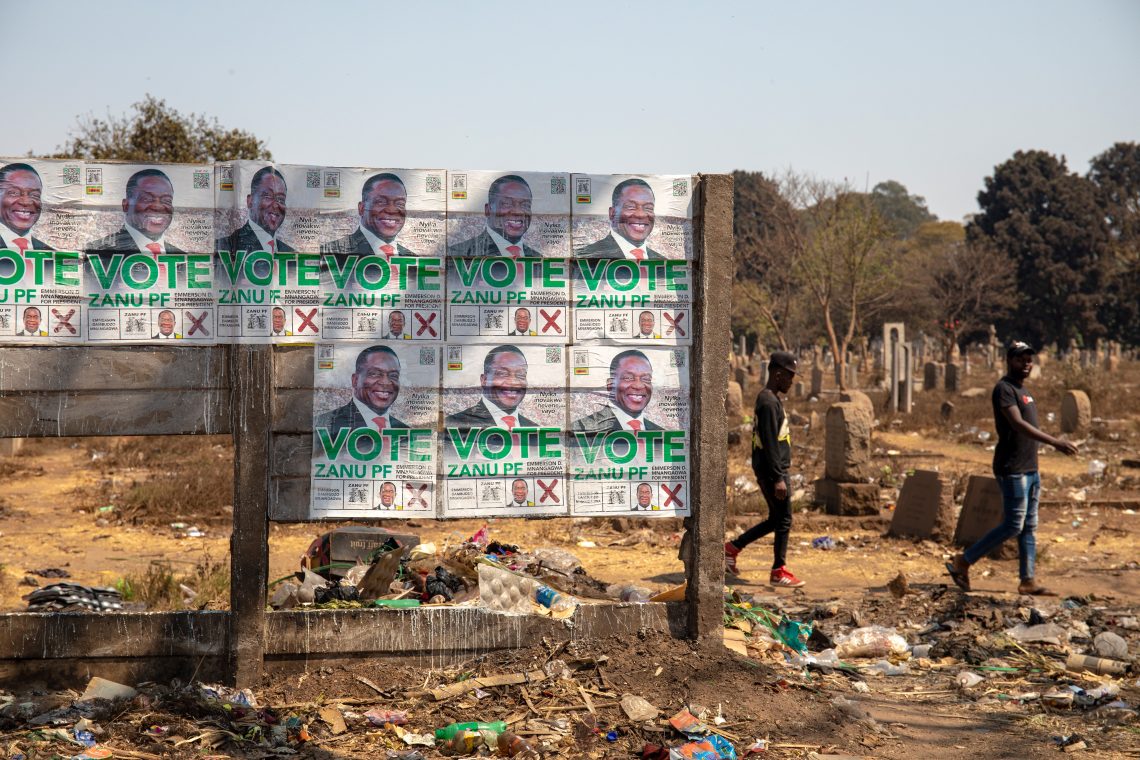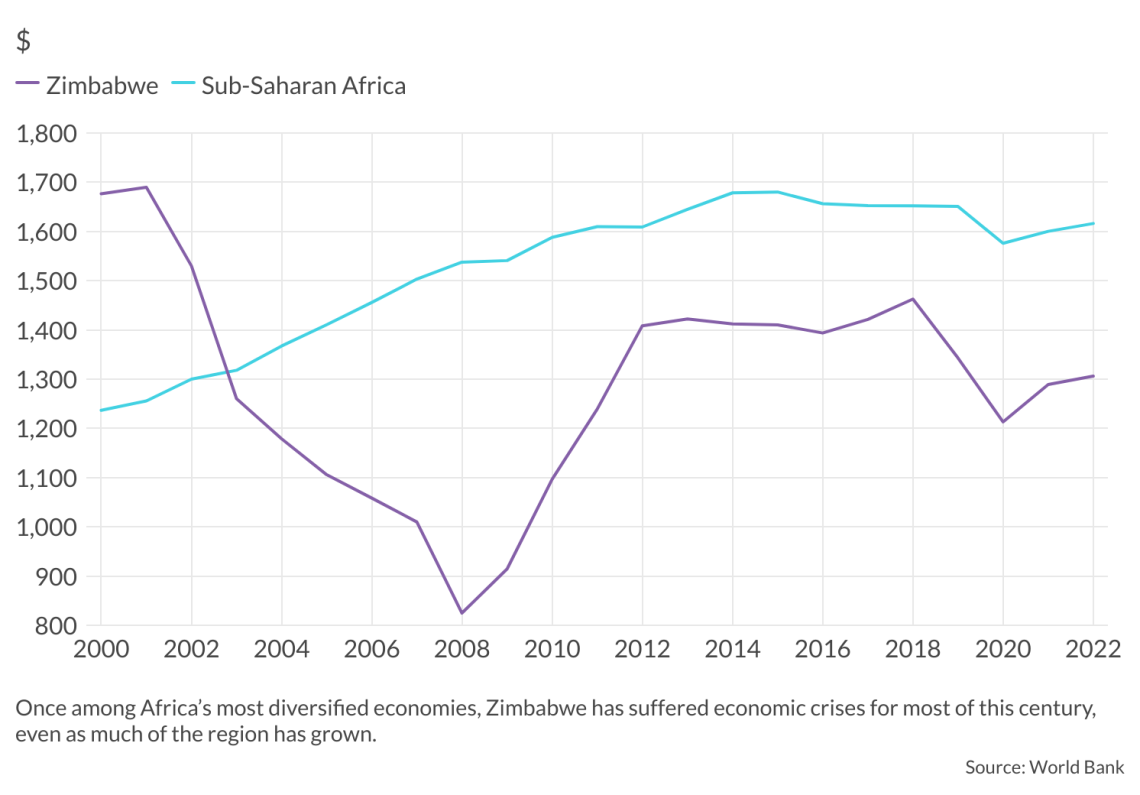Deepening dysfunction in Zimbabwe
The economic and political dysfunction that has plagued Zimbabwe for years is unlikely to lift anytime soon, leading to increased emigration and a drift toward Russia and China.

In a nutshell
- Poverty and social dissatisfaction are widespread
- The ruling party has strengthened ties with the military
- Corruption has brought the regime closer to Russia and China
In 2017, with the end of Robert Mugabe’s decades-long rule in Zimbabwe, President Emmerson Mnangagwa promised a “new dawn” for the country and assured investors the country was “open for business.” Mr. Mnangagwa, formerly a key figure in Mr. Mugabe’s regime, was declared the winner of the 2018 elections, but the results were heavily contested by the opposition.
Five years later, the promises of new jobs, compensation for land seizures and a political opening have not been fulfilled. The latest elections in August confirmed that the country remains immersed in a vicious cycle of economic crises and authoritarianism. And, instead of promoting democratic reform, continued Western sanctions have helped push Zimbabwe into the orbit of Russia and China.
Resilient authoritarianism
Zimbabwe is a testament to the failures and limits of the so-called third wave of democratization. Since 2018, it has also illustrated – like the cases of Libya or Sudan – that ending a resilient, personalized authoritarian regime does not guarantee a transition to democracy.
The results of the first vote held after the overthrow of Robert Mugabe were contested by the opposition, led by Nelson Chamisa. The post-election period was marked by violence, as protests were repressed by the military. Over the past five years, Zimbabwe’s African National Union-Patriotic Front (ZANU-PF) alliance has deepened its hold on power under the leadership of President Mnangagwa and through legislation such as the recently signed Patriotic Bill, which further constrains activities of the media, opposition parties and civil society.
Repeating a pattern observed in Zimbabwe’s voting history since the early 2000s, the August election was marked by irregularities, including delays in the delivery of ballot papers to opposition strongholds. The outcome has been contested by the opposition and international observers like the European Union. More importantly, the African Union and the Southern Africa Development Community have also questioned the integrity of the process.
State control
In Zimbabwe, the hegemony of the ZANU-PF goes hand in hand with an economic policy determined by the logic of neopatrimonialism, under which officials exploit their control over the state and society for their own benefit. Once among Africa’s most industrialized and diversified economies, Zimbabwe has with brief exceptions suffered consecutive economic and financial crises since the beginning of this century. Among other ills, the economy has never recovered from the effects of the Fast-Track Land Reform implemented in the 2000s, or the Indigenization and Economic Empowerment Program launched in 2008.
After the overthrow of Robert Mugabe, the ZANU-PF restored its allegiance to the military by appointing former General Constantino Chiwenga to serve as vice president of both Zimbabwe and the ZANU-PF. This bond, which for decades sustained the country’s regime and was only briefly interrupted in 2016-2017, remains the main obstacle to political competitiveness.
Neopatrimonialism requires connecting the military, political and economic domains, for those in power to use public resources to dole out financial rewards and other advantages to specific groups, especially within the military.
Read more from Teresa Nogueira Pinto
The lost promise of South Africa
President Mnangagwa has lately been accused of running the state as a “family business,” after his son and his nephew were appointed to an expanded cabinet. But charges of nepotism in Zimbabwe are hardly new. Bona Mugabe, daughter of the late president, was appointed to a censorship board created under the Censorship and Entertainment Controls Act, as well as to the board of Empower Bank run by the National Indigenization and Economic Empowerment Board. When planning for his succession, Robert Mugabe attempted to have his wife, Grace, succeed him in the ZANU-PF leadership.
The exploitation of natural resources has also been heavily politicized in Zimbabwe, a concern that is becoming newly relevant. After land and diamonds, lithium has become a crucial source of income in the country. Global demand for the metal, a critical component of electric vehicle batteries, has more than tripled over the past five years. In 2022, the Chinese mining company Sinomine Resource Group acquired Zimbabwe’s Bikita mine, one of the world’s largest known lithium deposits.
Economic chaos
Besides the authoritarian turn, the 2000s also paved the way for a complete transformation of the Zimbabwean economy. Since then – with the exception of the National Unity Government of 2009-2013, when the ZANU-PF formally shared power with the opposition Movement for Democratic Change (MDC) – the country has been mired in economic stagnation and financial crises. Just as political reforms – including of the security and electoral systems and the reversal of repressive legislation – remain necessary for any political opening, future economic growth will require major policy changes.
In the absence of a new direction in monetary and fiscal policies, the central bank’s decision to reintroduce the Zimbabwean dollar in 2019 (after its withdrawal in 2009 in favor of foreign currencies like the U.S. dollar and South African rand) has once more led to hyperinflation. The high interest rates set by the Reserve Bank of Zimbabwe (RBZ) have not prevented the continuous devaluation of the Zimbabwean dollar, and inflation surged to 175 percent last June.
Facts & figures
Today, the socioeconomic context is defined by high poverty rates (estimated at over 60 percent), high inflation, high unemployment rates and excessive debt. Most Zimbabweans rely on the informal economy to circumvent the restraints of overregulation. Informal cross-border trade has long been a key source of income for many residents. And, as always, people vote with their feet. There are some 1 million Zimbabweans living in South Africa today, accounting for over 80 percent of the country’s diaspora.
Moreover, as the government continues to focus on public spending, Zimbabwe has a serious debt problem. Mthuli Ncube, who will continue to serve as finance and economic development minister thanks to Mr. Mnangagwa’s victory in the August elections, has released a 2024 budget plan predicting the equivalent of some $91 billion in spending and $84 billion in revenue (assuming that the economy will grow by 5 percent). In 2023, spending saw a five-fold increase.
Looking east, again
Without reforms, and with those in power having every incentive to stamp out political and economic competitiveness, prospects for change remain low. Instead of giving in to Western sanctions, Zimbabwe’s ruling elite is increasingly turning to governments like Beijing and Moscow for resources and support.
Due to its debt arrears, the government’s ability to borrow money in the international market is severely restrained. The country owes around $14 billion to regional and international financial institutions like the African Development Bank and the World Bank.
To be sure, perceptions of high economic and political risks deter many investors from venturing into Zimbabwe. But sanctions – which have hardly paved the way for democracy, as shown by the recent elections – have also helped reinforce ties between Zimbabwe and countries like China or Russia, regimes more willing and able to overlook these risks. Despite growing pressure from the African Union, it will be difficult for Western countries to lift sanctions on Zimbabwe, especially after the latest contested ballot.
Instead of giving in to Western sanctions, Zimbabwe’s leaders are increasingly turning to Beijing and Moscow for support.
In the most recent Russia-Africa Summit, held in July, Russian President Vladimir Putin promised to deliver 50,000 tons of grain to Zimbabwe. President Mnangagwa, one of 17 African leaders present at the summit, has expressed his support for Russia’s invasion of Ukraine.
China has also been a strategic partner in the country since its independence. In the early 2000s, after the imposition of Western sanctions, President Mugabe announced the Look East Policy, a means of evading the effects of sanctions and expanding relations with non-Western powers, especially China. Beijing has become a key provider of financing for the country, in sectors like infrastructure, energy and mining. This year, President Mnangagwa inaugurated a 600-megawatt coal-fired power plant, one of the first deals made under the Look East Policy.
Zimbabwe will not be able to restructure its debt without the support of Western lenders and multilateral financial institutions. But it will likely be an impediment that President Mnangagwa – who is personally targeted by sanctions – remains in place after the contested vote. The reintroduction of the U.S. dollar, monetary flexibilization and the delivery of $3.5 billion in compensation to farmers evicted from their lands during the Fast Track Land Reform are also seen as necessary conditions for Zimbabwe to restore its relations with Western countries and traditional lenders.
Scenarios
Given the current context along with the cyclical political and economic crises that have characterized Zimbabwe since the beginning of this century, there are two broad scenarios to consider.
More likely: Entrenchment
The first, and most likely, is continued corruption and a further entrenchment of the regime. Without incentives to change, those in power – including the most powerful wing of the military – will not implement political or democratic reforms.
This would accentuate an existing crisis of democratic fatigue. Across the continent, according to a 2022 Afrobarometer survey in 34 countries, 50 percent of Africans do not believe that elections are an effective way to put representative leaders in place. In another Afrobarometer survey conducted in 2023, before the elections, 56 percent of Zimbabweans saw post-election violence as “somewhat” or “very” likely.
Zimbabweans will continue to emigrate, delivering significant regional implications. Migration is a politicized issue in South Africa, reflected in cyclical episodes of violence and xenophobia. Such episodes will recur in the future and will continue to destabilize South African politics.
Nevertheless, given Zimbabwe’s authoritarian and relatively strong state (unlike, for example, those in some Sahelian countries), civil-society actors and young voters are expected to continue to fight for political change. And even the likely scenario of business as usual does not guarantee future stability. Zimbabwe combines a worrisome economic outlook and a population that is increasingly urbanized and predominantly young, with a median age of 18 years old. This means that political unrest will likely become inevitable in the medium term.
Less likely: Tipping point
Under a second scenario, an escalation of the cost-of-living crisis could more quickly trigger popular protests calling for the ouster of President Mnangagwa, as occurred in 2016-2017 with President Mugabe.
This remains unlikely, because compared to 2017, today’s ZANU-PF is more unified, and the strategic allegiance between the ZANU-PF and the military has been restored by the appointment of General Agustin Chiwenga as vice president. Moreover, important regional and international actors (like China) would not benefit from such a scenario of instability. And those third parties more skeptical of the ruling ZANU-PF, like the United Kingdom and the EU, are in no position to intervene in Zimbabwe’s affairs.
Given the structural problems in Zimbabwe’s economy and its political and institutional legacies, a scenario of political change driven by civil society will not be enough for democratization and prosperity.
For industry-specific scenarios and bespoke geopolitical intelligence, contact us and we will provide you with more information about our advisory services.









